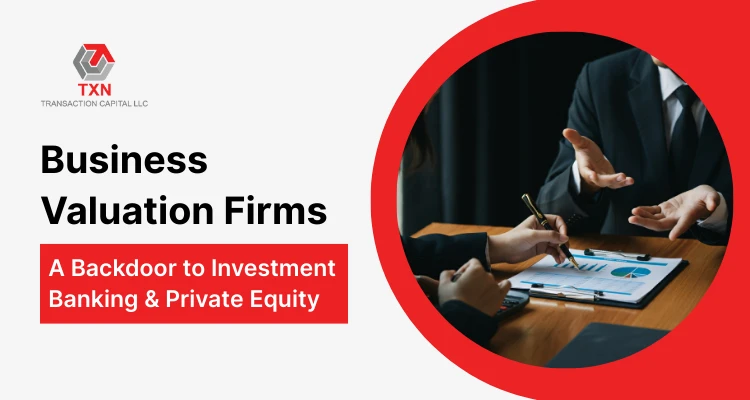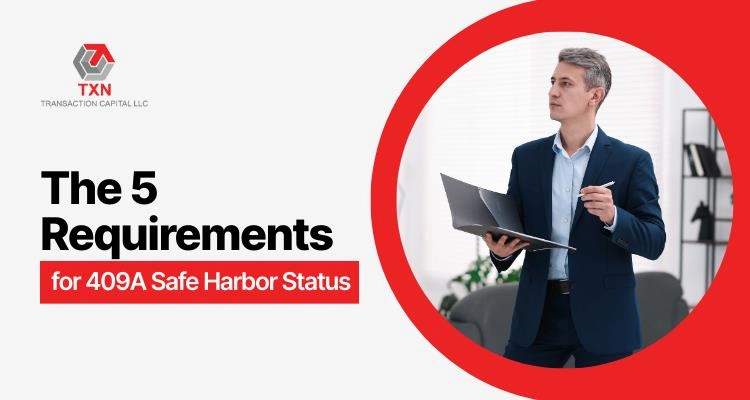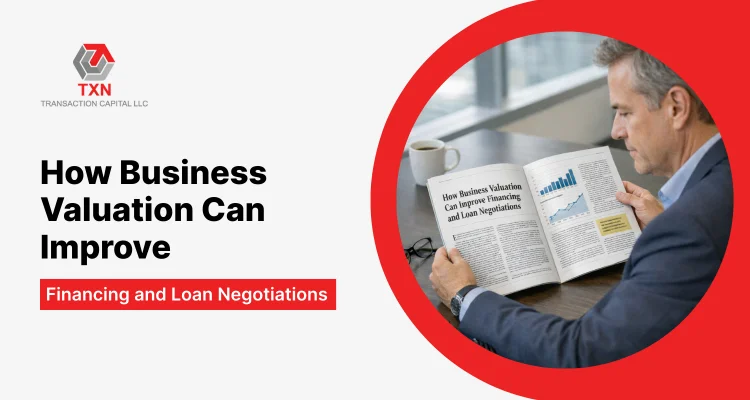Business Valuation Firms: A Backdoor to Investment Banking & Private Equity

Looking for an alternative path into investment banking or private equity? Business valuation firms offer one of the most underutilized yet effective entry points into these prestigious finance careers—without requiring an Ivy League pedigree or perfect GPA.
At Transaction Capital LLC, we've witnessed countless professionals leverage valuation expertise to transition into top-tier finance roles. This comprehensive guide reveals exactly how business valuation firms can become your strategic advantage in breaking into IB and PE.
What Makes Business Valuation Firms the Perfect Finance Career Launchpad?
Business valuation firms serve as specialized financial advisory organizations that determine fair market value for companies, securities, and intangible assets. Unlike investment banks that focus on deal execution, these firms provide the technical foundation that makes deals possible.
The key advantage? While investment banking recruitment favors elite school graduates, valuation firms recruit based on analytical ability and technical aptitude—opening doors for motivated professionals regardless of their educational background.
Core Functions of Professional Valuation Companies
1. 409A Equity Compensation Valuations
Private companies require defensible fair market value determinations for employee stock options. These valuations protect companies and employees from IRS penalties while supporting equity compensation programs.
2. Purchase Price Allocation Studies (ASC 805)
Following mergers and acquisitions, purchase prices must be allocated across acquired assets and liabilities at fair value. This process requires detailed intangible asset valuations for customer relationships, technology, and brand value.
3. Goodwill and Asset Impairment Testing (ASC 350/360)
Public and private companies regularly assess whether recorded goodwill or long-lived assets maintain their book values. Independent valuation firms conduct these compliance-driven assessments.
4. Portfolio Company Valuations for Private Equity
Venture capital and private equity funds require quarterly portfolio valuations for net asset value reporting, investor communications, and regulatory compliance.
5. ESOP Valuation Services
Employee Stock Ownership Plans mandate annual independent valuations to meet ERISA and IRS requirements, ensuring fair employee compensation and compliance.
6. Estate and Gift Tax Valuations
High-net-worth individuals rely on professional valuation services for wealth transfer planning, requiring defensible business valuations for closely-held companies and investment interests.
7. Litigation Support and Expert Witness Services
Complex legal disputes involving business valuations require independent expert analysis and testimony in shareholder disputes, divorce proceedings, and damages claims.
8. Intangible Asset and Complex Security Valuations
Specialized valuations for intellectual property, trademarks, software, patents, convertible instruments, and other non-traditional assets demand technical expertise and industry knowledge.
How Do Business Valuation Firms Differ from Investment Banks?
Understanding these distinctions helps position your transition strategy effectively:
| Category | Business Valuation Firms | Investment Banking |
|---|---|---|
| Work Scope | Independent valuations for compliance, tax, reporting, and dispute purposes | Deal execution including M&A, IPOs, debt raises, and equity financing |
| Approach | Narrow but highly detailed, deep-dive analysis | Broad, fast-paced, and multi-process execution focus |
| Typical Clients | CFOs, auditors, tax attorneys, fund controllers | CEOs, boards of directors, private equity sponsors, and investors |
| Key Deliverables | Valuation reports and audit-ready financial models | Pitch books, offering memoranda, and confidential information memoranda (CIMs) |
| Work Hours | 40–55 hours per week (with occasional busy periods) | 70–100+ hours per week during live deals |
| Entry-Level Pay | $60K–$80K base salary + small performance bonus | $100K–$150K base salary + 50–100% bonus |
| Long-Term Pay | $250K–$500K+ at Partner/Managing Director level | $500K–$1M+ at Managing Director/Partner level |
| Exit Opportunities | Investment banking, private equity, corporate development, equity research, FP&A | Private equity, hedge funds, corporate development, entrepreneurship |
Bottom line: Valuation emphasizes technical precision and regulatory compliance, while investment banking prioritizes speed and transaction completion.
What Technical Skills Do You Develop at Valuation Firms?
1. Advanced Financial Modeling Expertise
- Comprehensive DCF Models: Multi-scenario cash flow projections with detailed working capital, capital expenditure, and financing assumptions
- Market-Based Valuation Methods: Guideline public company analysis and precedent transaction studies with statistical adjustments
- Asset-Based Approaches: Net asset value methods for asset-intensive businesses and liquidation scenarios
2. Complex Capital Structure Analysis
- Equity Waterfall Modeling: Valuing companies with multiple share classes, preferred stock, and convertible securities
- Option Pricing Applications: Black-Scholes and binomial models for complex capital structures and contingent payments
- Monte Carlo Simulations: Probability-weighted scenarios for uncertain outcomes and risk assessment
3. Specialized Intangible Asset Valuation
- Intellectual Property Valuations: Relief-from-royalty methods for patents, trademarks, and proprietary technology
- Customer Relationship Analysis: Multi-period excess earnings approaches with contributory asset charges
- Brand and Trade Name Valuations: Market-based and income-based methods for brand equity assessment
4. Regulatory Compliance and Standards Mastery
- Accounting Standards: ASC 805, 820, 350, 718 for financial reporting requirements
- Tax Regulations: IRS Revenue Ruling 59-60 for federal tax compliance
- Professional Standards: USPAP, IVS, and AICPA guidelines for valuation practice
5. Critical Analytical Judgment Development
- Discount and Premium Applications: Marketability, control, and size discounts based on empirical studies
- Risk Assessment: Company-specific and systematic risk adjustments for cost of capital
- Documentation Standards: Audit-defensible support for every valuation assumption and conclusion
6. Professional Communication Skills
- Executive Presentations: Delivering complex valuation findings to C-suite executives and board members
- Written Communication: Comprehensive valuation reports suitable for regulatory review and legal proceedings
- Stakeholder Management: Building credibility with auditors, attorneys, and investment professionals
What Are the Compensation and Lifestyle Benefits?
Business valuation firms serve as specialized financial advisory organizations that determine fair market value for companies, securities, and intangible assets. Unlike investment banks that focus on deal execution, these firms provide the technical foundation that makes deals possible.
The key advantage? While investment banking recruitment favors elite school graduates, valuation firms recruit based on analytical ability and technical aptitude—opening doors for motivated professionals regardless of their educational background.
Why Are Valuation Firms Considered the Best Backdoor into IB and PE?
1. Lower Recruiting Barriers
Investment banks often recruit almost exclusively from top target schools. In contrast, valuation firms cast a wider net, giving professionals from diverse backgrounds—and even late entrants—a genuine opportunity to break in.
2. Strong Technical Foundation
Valuation professionals typically develop deeper financial modeling and analytical skills than many bankers. This technical expertise builds a solid foundation that translates seamlessly into investment banking (IB) and private equity (PE) roles.
3. Direct Deal Overlap
Valuation work often involves projects such as purchase price allocations (PPAs), impairment testing, and portfolio valuations—all of which directly connect to M&A and PE deal activity. Analysts can use this overlap to pivot into more transaction-driven roles.
4. Sponsor-Level Exposure
Private equity and venture capital funds frequently engage valuation firms. By working on portfolio valuations, professionals gain direct exposure to sponsors—the very clients they may later pursue careers with.
How Can You Successfully Transition from Valuation to Investment Banking?
Optimal Timing Strategy
Target 12-24 months in valuation before transitioning. This timeframe provides sufficient technical skill development while avoiding career pigeonholing as a permanent valuation specialist.
Focus on Relevant Experience
- Prioritize M&A-related assignments: Purchase price allocations, transaction-related impairments, and deal support valuations
- Seek private equity client exposure: Portfolio valuations and sponsor-related projects
- Develop transaction vocabulary: Understanding of IOIs, LOIs, management presentations, and due diligence processes
Strategic Networking Approach
- Target middle-market banks where technical expertise receives greater appreciation
- Leverage existing client relationships with private equity funds and corporate development teams
- Attend industry conferences focused on M&A and private equity transactions
Interview Preparation Essentials
- Master modeling tests: Practice three-statement models, LBO analyses, and comparable company studies
- Develop deal stories: Articulate how valuation experience relates to transaction execution
- Demonstrate commercial awareness: Show understanding of market trends and deal dynamics beyond pure technical analysis
Positioning Your Value Proposition
Frame valuation experience as providing the analytical foundation necessary for successful deal execution. Emphasize technical rigor, attention to detail, and ability to support complex transaction structures.
What About Direct Transitions into Private Equity?
While less common than investment banking transitions, moving directly from valuation to private equity remains achievable with the right strategy:
Target Opportunities
- Smaller funds and growth equity shops value technical analysis skills
- Corporate venture capital arms appreciate valuation expertise for portfolio management
- Fund-of-funds require ongoing portfolio valuation capabilities
Leverage Portfolio Valuation Experience
Direct experience valuing private equity portfolio companies demonstrates understanding of fund operations, performance measurement, and investor reporting requirements.
Develop Investment Thesis Skills
Supplement valuation expertise with market analysis, competitive assessment, and strategic planning capabilities to demonstrate investment judgment beyond pure technical analysis.
Long-Term Career Prospects in Professional Valuation
Not every professional chooses to leave valuation, and many build rewarding long-term careers:
Senior Leadership Opportunities
- Expert witness testimony in high-stakes litigation matters
- C-suite advisory roles for complex valuation challenges
- Specialized practice development in emerging areas like ESG valuations and digital assets
Independent Practice Development
Experienced professionals often establish independent valuation practices, serving as trusted advisors to law firms, accounting firms, and corporate clients.
Academic and Thought Leadership
Many senior valuation professionals contribute to professional literature, academic research, and industry standard development.
What Services Do Leading Valuation Firms Provide?
At Transaction Capital LLC, we offer comprehensive valuation solutions including:
Core Business Valuation Services
- Startup Valuation Services for early-stage company equity programs
- Business Valuation Services for established companies across all industries
- ESOP Valuation Services for employee ownership transition planning
Specialized Advisory Services
- Gift & Estate Tax Valuation Services for wealth transfer planning
- Intangible Valuation for intellectual property and technology assets
- Fairness Opinions for transaction and governance decisions
- QSBS Attestation Services for qualified small business stock benefits
Investment and Sustainability Services
- Equity Research for institutional and high-net-worth clients
- ESG & Sustainability valuations for responsible investing initiatives
- Real Estate Valuation Services for commercial and investment properties
Ready to Launch Your Finance Career Through Valuation?
Business valuation firms represent far more than a "backdoor" into investment banking and private equity—they're a legitimate front door to developing world-class analytical skills, building industry relationships, and creating multiple career pathways.
Whether you're targeting an eventual transition to investment banking, planning a private equity career, or building long-term expertise in professional valuation, these firms provide unmatched technical training and professional development opportunities.
Ready to explore how valuation expertise can accelerate your finance career? Contact Transaction Capital LLC for a free consultation to discuss your professional development goals and learn about our comprehensive valuation services across industries.
Frequently Asked Questions

Dr. Gaurav B.
Founder & Principal Valuer, Transaction Capital LLC
Specialist in IRS-Compliant 409A & Complex Valuation Matters
Dr. Gaurav B. is the Founder and Principal Valuer of Transaction Capital LLC, a valuation and financial advisory firm providing independent, standards-based valuation opinions for startups, growth-stage companies, and established enterprises.




